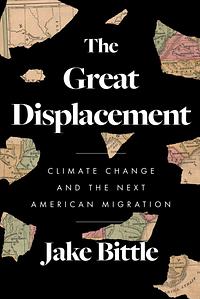Take a photo of a barcode or cover
challenging
hopeful
informative
inspiring
reflective
fast-paced
hopeful
informative
sad
fast-paced
informative
reflective
medium-paced
informative
reflective
medium-paced
challenging
dark
informative
reflective
medium-paced
informative
reflective
medium-paced
Frightening to read. We always hear that the biggest threat to humankind is climate change, but to read examples of how it is affecting us and will continue to affect us is startling. As someone from a flood-prone city, it opened my eyes to the very real possibility that my city could be gone in the future. But I didn't finish this book feeling despair at what could happen to us, the author left us on a more hopeful note.
So much information was packed here, but I never felt like the book was too dense to get through. I like how each chapter focused on a city that is being affected by climate change and that it had stories of different residents of those cities. I appreciated how he emphasized that displacement hurts the marginalized more, even climate change affects us differently along racial/class lines.
One of my most important reads this year for sure.
"By the end of the century, climate change will displace more people in the United States than moved during the Great Migration, uprooting millions of people in every region of the country."
"migration is not quite the right word... the word implies an intentional, one-directional action, but the movement on the ground is more diffuse. It looks less like an arrow shooting through shooting through the air and more like water churning in a pot as it reaches a boil. Hence the use in this book of the term "displacement" which conveys the reality: these movements will be unpredictable, chaotic, and life-changing."
"The first three chapters examine the three major forces that create climate displacement. The first and most obvious force is the ever-increasing severity of weather disasters, the second force is government policy, the third and most chaotic force is the private housing market."
"even a conservative estimate suggests that more than hundreds of millions of people worldwide will meet the status of climate migrants by the end of the century. In the US alone, at least twenty million people may move as a result of climate change, more than twice as many as moved during the entire span of the Great Migration”
“By the middle of the century, housing displacement will be the most visible and ubiquitous consequence of climate change, the one dynamic that unites the sinking islands of the Sundarbans with the desiccated landscapes of Guatemala and chad. It will function as the currency of climate damage, the common consequence of climate-driven famine and climate-driven bankruptcy and climate-driven armed conflict. Climate change makes the world more unstable, and instability makes more people move.”
“It is heat that will cause climate migration to expand from a set of isolated displacement events into a phenomenon that is truly regional in nature, a demographic shift that enfolds the entire country.”
“Given that these rich countries are the same historical emitters who warmed the earth in the first place, the moral response for a nation like the US is not to close its borders but to rethink how it provides housing, both to its own citizens and to those arriving from abroad… in an age of permanent instability, we must do everything we can to create a universal guarantee of shelter.”
“Responding to future climate displacement will require us to recognize that all human beings are entitled to safe housing, not just those who have bought a house and purchased insurance to protect it.”
So much information was packed here, but I never felt like the book was too dense to get through. I like how each chapter focused on a city that is being affected by climate change and that it had stories of different residents of those cities. I appreciated how he emphasized that displacement hurts the marginalized more, even climate change affects us differently along racial/class lines.
One of my most important reads this year for sure.
"By the end of the century, climate change will displace more people in the United States than moved during the Great Migration, uprooting millions of people in every region of the country."
"migration is not quite the right word... the word implies an intentional, one-directional action, but the movement on the ground is more diffuse. It looks less like an arrow shooting through shooting through the air and more like water churning in a pot as it reaches a boil. Hence the use in this book of the term "displacement" which conveys the reality: these movements will be unpredictable, chaotic, and life-changing."
"The first three chapters examine the three major forces that create climate displacement. The first and most obvious force is the ever-increasing severity of weather disasters, the second force is government policy, the third and most chaotic force is the private housing market."
"even a conservative estimate suggests that more than hundreds of millions of people worldwide will meet the status of climate migrants by the end of the century. In the US alone, at least twenty million people may move as a result of climate change, more than twice as many as moved during the entire span of the Great Migration”
“By the middle of the century, housing displacement will be the most visible and ubiquitous consequence of climate change, the one dynamic that unites the sinking islands of the Sundarbans with the desiccated landscapes of Guatemala and chad. It will function as the currency of climate damage, the common consequence of climate-driven famine and climate-driven bankruptcy and climate-driven armed conflict. Climate change makes the world more unstable, and instability makes more people move.”
“It is heat that will cause climate migration to expand from a set of isolated displacement events into a phenomenon that is truly regional in nature, a demographic shift that enfolds the entire country.”
“Given that these rich countries are the same historical emitters who warmed the earth in the first place, the moral response for a nation like the US is not to close its borders but to rethink how it provides housing, both to its own citizens and to those arriving from abroad… in an age of permanent instability, we must do everything we can to create a universal guarantee of shelter.”
“Responding to future climate displacement will require us to recognize that all human beings are entitled to safe housing, not just those who have bought a house and purchased insurance to protect it.”
challenging
dark
informative
medium-paced
informative
medium-paced
dark
reflective
sad
medium-paced
Books about the specific human effects of climate change are so important. I was expecting this to be a bit more speculative, but it spends a lot of time on issues we're facing now, with flooding and wildfires, for example.
This is a call to action - not to simply stop climate change, but to implement better ways to care for those already harmed by it.
This is a call to action - not to simply stop climate change, but to implement better ways to care for those already harmed by it.







